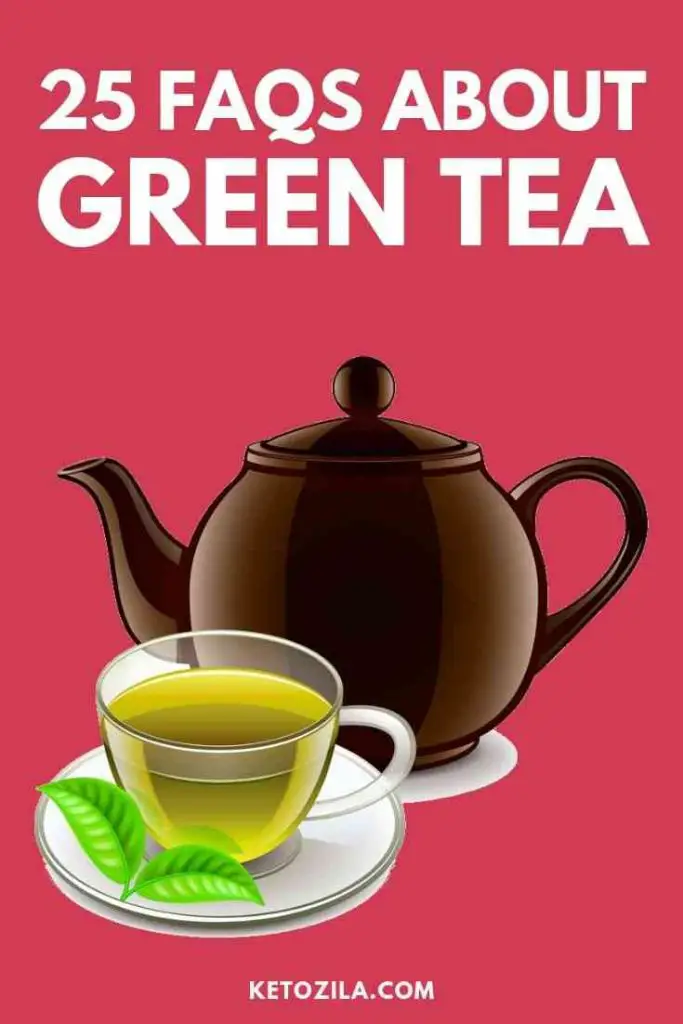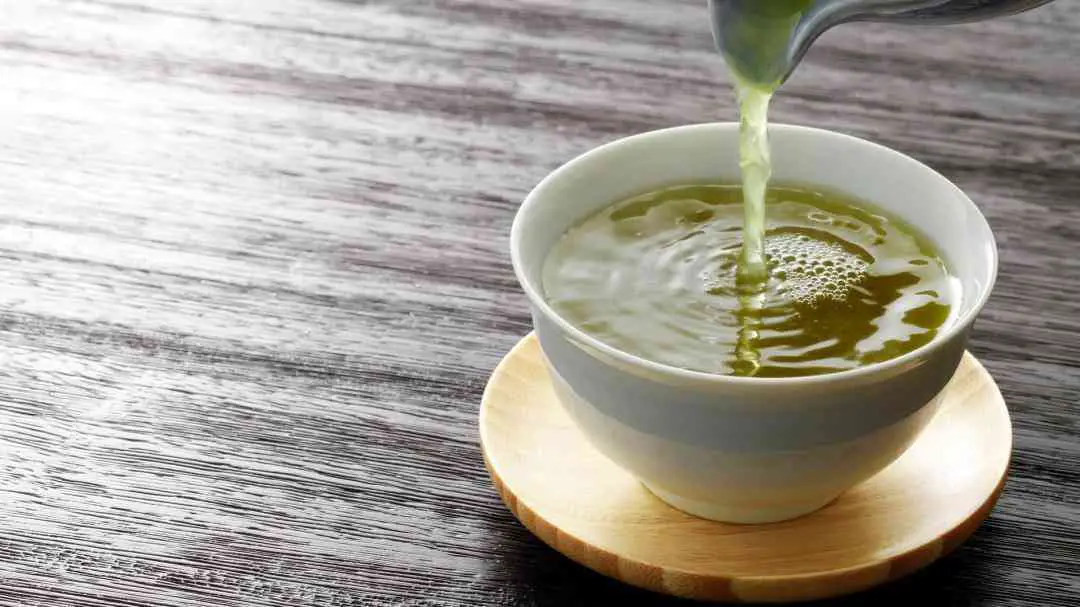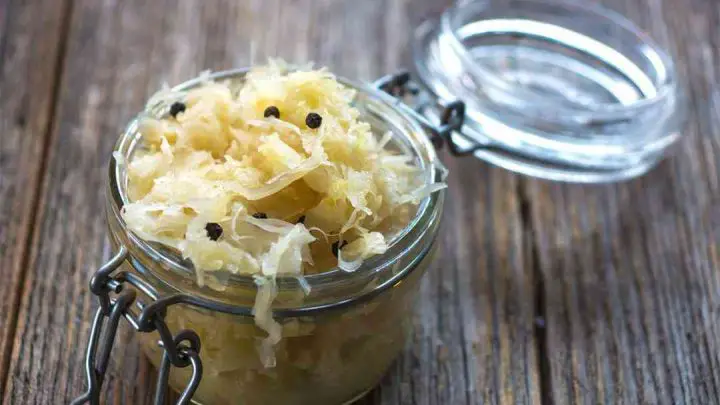Green tea is one of the healthiest beverages on the planet. It is loaded with antioxidants which can eliminate free radicals and can lower your blood sugar level. A cup of green tea does not contain any calories or carbs so it is a great beverage option if you are trying to lose weight or if you are following a low-carb diet.
We have received a lot of questions about green tea so we have compiled all the answers to your questions in this Green Tea Keto FAQ page.
But first, let’s check the nutritional profile of green tea, which is surprisingly all zeroes despite the fact that it packs a lot of healthy antioxidants and minerals.
Yes, green tea is keto-friendly because it does not contain calories, carbs, or sugar. Moreover, it also contains polyphenol, an antioxidant that increases metabolism, and caffeine, a substance that improves insulin sensitivity and increases fat oxidation. Thus, green tea is one of the best beverage to drink on keto if you want to lose weight faster.
Yes, you can drink green tea while on intermittent fasting since it does not have carbs or calories. Just like water, green tea will not kick you out of a fasted state. The only difference with green tea is it contains small amounts of caffeine and it has flavor.
Yes, green tea contains about 35 mg of caffeine per 8-ounce serving. In comparison, brewed coffee contains 95 mg of caffeine per 8-ounce serving. Green tea is a milder alternative if you are sensitive to caffeine from coffee.
Yes, green tea is a diuretic even if it only contains a small amount of caffeine. Excessive drinking of green tea may also lead to frequent urination due to the extra fluid intake of your body.
Yes, green tea helps you lose weight because it is calorie-free and it contains polyphenol and caffeine. Polyphenol is an antioxidant that is known to increase metabolism and prevent obesity while caffeine is a substance that improves insulin sensitivity and increases fat oxidation. The combination of these two fat-burning ingredients makes green tea one of the best beverages to drink when trying to lose weight.
Yes, green tea can make you poop more because it contains caffeine. Caffeine is known to cause your anal sphincter to contract which results in an earlier desire to poop.
No, green tea is not acidic because its pH level is between 7 to 10. A pH level below 7 is considered acidic, a pH level of 7 is considered neutral, and a pH level between 7 and 14 are considered alkaline. Thus, green tea can be considered as alkaline.
Most studies are suggesting that drinking moderate amounts of caffeine during pregnancy has no negative effects on the baby. However, other findings show that drinking excessive amounts of caffeine can lead to premature birth, miscarriages, and low birth weight. The good thing about green tea is that it only contains a small amount of caffeine as compared to coffee. Thus, it should not have harmful effects on your pregnancy if you only drink 1-2 cups per day.
A brewed green tea without any additives like milk or sugar does not have any calories.
No, green tea does not contain more caffeine than coffee. Green tea contains about 35 mg of caffeine per 8-ounce serving while brewed coffee contains 95 mg of caffeine per 8-ounce serving.
Yes, green tea is anti-inflammatory because it is an excellent source of epigallocatechin 3-gallate (EGCG). EGCG is a polyphenol antioxidant that fights free radicals and has strong anti-inflammatory properties. It is also known to be used in treatments for cancer, oral diseases, Alzheimer’s disease.
No, green tea is not the same as herbal tea. Actually, herbal tea is not technically a tea since it is not made from a tea plant Camellia Sinensis unlike true teas such as green, white, yellow, dark, oolong, and black tea.
No, green tea does not cause dehydration. Studies show that it takes at least 500 mg of caffeine (or 14 cups of green tea) for it to have significant amounts of diuretic effect. Drinking green tea in moderation is hydrating as drinking water.
Yes, green tea is good for diabetics because it is an excellent source of epigallocatechin 3-gallate (EGCG). EGCG is a polyphenol antioxidant that can reduce the amount of glucose that is passed into the bloodstream. It can also mimic insulin-like behavior which inhibits the liver’s production of glucose, thus lowering blood sugar level.
No, green tea does not cause the production of kidney stones, it actually prevents it. Research has found that green tea extract naturally bonds to calcium oxalate, a compound from which most kidney stones are formed. The bond between green tea extract and calcium oxalate then forms into a different shaped crystal, which makes it harder for them to clump together and form into large kidney stones.
Green tea contains less caffeine than black tea – about 35 mg per 8 oz cup for green tea while 40 – 110 mg for an equal serving of black tea.
Yes, green tea is good for the skin because it is rich in polyphenols. Polyphenols can help the skin in three ways. First, it can prevent skin cancer by stimulating DNA repair. Second, it also has anti-inflammatory properties which can reduce redness, irritation, and swelling. And lastly, it also has an antibacterial agent that can fight bacterial membranes and prevent infection.
Yes, green tea might raise the blood pressure of individuals that are not regular tea drinkers. However, this is not the case for people who regularly drink tea.
It is not recommended to consume more than 300 mg of caffeine per day when breastfeeding. However, green tea only contains 35 mg of caffeine per cup so 1 to 3 cups of green tea a day won’t have harmful effects on your newborn.
Yes, green tea can keep you awake because it contains caffeine. However, coffee is a better choice if you intend to stay awake because it contains more than double the amount of green tea’s caffeine content.
As long as you steep the tea for at least 3 minutes, then you can drink green tea cold without losing its antioxidant content. However, cold green tea contains less caffeine than hot.
Green tea does not contain sugar and it has no calories as well as long as you drink it plain from the bag. It is an excellent beverage option for a diabetes diet.
Yes, green tea is good for UTI because its polyphenol content has antimicrobial properties that can fight E. coli, the bacteria that causes UTI.
Despite having small amounts of caffeine, green tea is known to have a calming and soothing effect because of its L-Theanine content. L-Theanine helps reduce symptoms of anxiety and most people feel mellow after drinking green tea.
Yes, green tea contains 0.23 to 1.15 mg of oxalates per gram of green tea. This is lower compared to black tea which contains 4.68 mg/g. Compared to other teas, black tea is known to have better binding capabilities to calcium oxalates for preventing kidney stone production.
Don’t forget to share this green tea facts with a friend!

References
- https://www.ncbi.nlm.nih.gov/pmc/articles/PMC3257683/ – Effects of Polyphenols on Metabolism
- https://www.ncbi.nlm.nih.gov/pubmed/7369170 – Effects of Caffeine on Metabolism
- https://www.ncbi.nlm.nih.gov/pubmed/18350336 – Effects of Caffeine on Defecation
- https://www.hindawi.com/journals/bmri/2017/5615647/ – EPCG as Treatment to Different Diseases
- https://www.ncbi.nlm.nih.gov/pmc/articles/PMC5572593/ – EPCG as Treatment to Cancer
- https://www.ncbi.nlm.nih.gov/pubmed/12118006 – Effects of EPCG on Glucose Production
- https://www.healthline.com/health/pregnancy/green-tea-while-pregnant – Green Tea, Pregnancy
- https://www.ncbi.nlm.nih.gov/pmc/articles/PMC3288507/ – Polyphenols and Skin Cancer
- https://www.ncbi.nlm.nih.gov/pmc/articles/PMC3684790/ – Effects of Green Tea on UTI
- https://www.ncbi.nlm.nih.gov/pubmed/12495262, Oxalate Content on Different Teas





